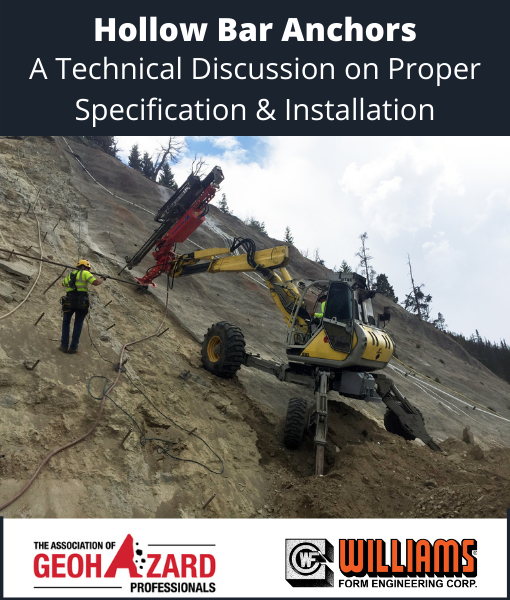View this webinar on-demand by logging into the Member Center. If you are not a member, we encourage you to join.
Hollow Bar Anchors:
A Technical Discussion on Proper Specification & Installation
Structural anchoring and underpinning using grout-bonded elements is a common approach for today’s Civil Engineering community. These high capacity, drilled & grouted elements provide the critical load transfer mechanism in a cost-effective, robust design approach. The anchoring and micropile industries continue to mature and add new products and approaches as the needs of the marketplace are recognized and addressed.
One such advancement is the increased specification of hollow bar elements. With a solid bar or strand anchor the installer must initially provide a hole in which the anchor can be placed prior to grouting. In certain ground conditions, where cohesionless soils are likely to cause a collapse in the hole, a hollow bar element is often considered as a cost-effective and production-efficient option in lieu of cased drilling. These simultaneous drill & grout hollow bars maintain an open hole, increase job site efficiency, assist in meeting tough schedule requirements, and their use has been increasing dramatically over the past 2 decades.
In this webinar, we will discuss details unique to the hollow bar system. We will cover recent research conducted through the Federal Highway Administration, emergence of the system in governing specifications, and discuss what seems to be the main issue with permanent hollow bar anchors: long-term durability.

Presented By:

Tom Bird
Vice President of Corporate Development, Williams Form Engineering
Tom is the Vice President of Corporate Development for Williams Form Engineering Corporation, a world leader in the manufacture of ground anchoring systems. Tom has been actively involved in the civil engineering industry, specifically with ground anchors, since 1997.
Tom is the past Chairman of the Anchored Earth Retention Committee of ADSC and has a long tenure of activity within both the ADSC and DFI anchoring committees. During that time Tom was instrumental in the industry advancement of hollow bar anchor technology, culminating in the publication of FHWA-CFL/TC10-100 which led to the acceptance of hollow bars for use in federally funded projects.
Tom holds BSME and MSMM degrees and is currently a faculty member at Red Rocks Community College in Colorado.

Jeff Pendleton
Applications Engineer, Williams Form Engineering
Jeff is a Project / Applications Engineer for Williams Form Engineering Corporation. Jeff has been actively involved in the geotechnical and structural engineering industry, specializing in geostructural interfacing, since 2010.
Jeff is currently involved with the organizations of CAGE and ADSC and has participated in ASCE, DFI, and SEAC events. He has also been involved in the design-build spectrum with a wide variety of projects involving the implementation of hollow bar solutions.
Jeff has a BSE (Civil Specialty) and is currently registered as a PE (Structural) in both Colorado and Tennessee.
